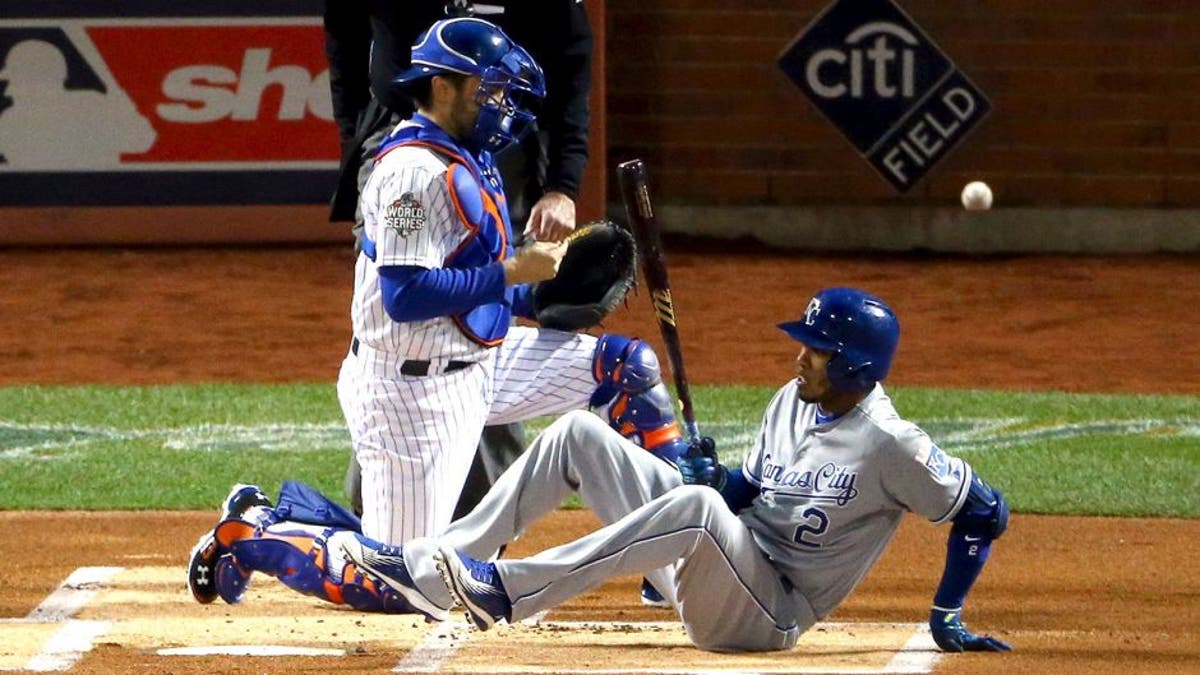
NEW YORK, NY - OCTOBER 30: Alcides Escobar #2 of the Kansas City Royals sits on the field after being brushed back by a pitch as Travis d'Arnaud #7 of the New York Mets controls the ball in the first inning during Game Three of the 2015 World Series at Citi Field on October 30, 2015 in New York City. (Photo by Elsa/Getty Images)
NEW YORK -- Somewhere in the past few decades, pitching high and inside has become an offense, a violation of baseball etiquette if not the rules.
Batters with multimillion-dollar contracts go ballistic when a cowhide-covered sphere of roughly 5 ounces and 9-inch circumference whizzes by their whiskers, even if they get up unscathed.
So when the Mets' Noah Syndergaard opened Game 3 of the World Series with a 97-mph pitch above the head of Alcides Escobar, sending the Kansas City leadoff hitter sprawling on his butt, the Royals screamed as if the rookie pitcher had turned into a mound version of Dirty Harry.
''You watch guys growing up, Roger Clemens and Pedro Martinez, all those epic battles that they had, and I think the time has changed,'' fellow Mets pitcher Matt Harvey said Saturday. ''But this is part of baseball. As a power pitcher you've got to keep guys uncomfortable and off balance. When there's a time to do it, there's a time to do it.''
With the Mets trailing 2-0 in the Series, Syndergaard said ahead of his outing that he had ''a few tricks'' up his sleeve for Escobar, who hit an inside-the-park home run on Harvey's first pitch of the opener and flied out on Jacob deGrom's opening pitch of Game 2. After Syndergaard's opening offering, Escobar wound up sitting in the batter's box, one leg on each side of home plate, as teammates shouted from the dugout with words that make parents blush.
''I think it set a tone that, hey, look, we're in this World Series, too, and we're going to get after it,'' Mets manager Terry Collins said.
Escobar struck out, and the Mets went on to win 9-3. The day after Syndergaard caused a stir, Collins made it seem like it was Noah's lark. He said he did not have advance knowledge of the plan. The manager said it showed ''he's not afraid of anybody'' and called pitching inside ''a lost art,'' but he also admitted ''guys take a huge offense to it, because you'll miss time'' if the batter actually does get it.
''But I still think it's got to be part of the game,'' Collins said.
Escobar thought Syndergaard could have backed him off by throwing low and inside.
''You don't need to throw to my head,'' he said.
If anything, perhaps Syndergaard was guilty of advertising his intentions.
''No one in here is stupid. We know what he said,'' Royals first baseman Eric Hosmer said.
Major League Baseball did not appear to be investigating Syndergaard for possible discipline. But the words and action of the 23-year-old could lead to retaliation.
''I didn't expect him to throw a strike, but I didn't expect him to throw it under his chin, either,'' Royals manager Ned Yost said. ''But we've got a few tricks up our sleeves, too.''
Fueled by adrenaline and testosterone, batters and pitchers have been battling for more than a century and a half. Umbrage has increased as the average salary has risen to about the $4 million mark, when an injury can have huge financial implications.
''You can end a player's career by not intentionally hitting them in the head,'' Yost said.
He viewed the chest as the contemporary dividing line for acceptability.
''You've seen us at times with Daniel Murphy pitch in on him, but it's never been up and in,'' Yost said. ''It was an acceptable thing to be able to move guys away, up top. And we've kind of gotten away from that now.''
Back in 1969, when the Cubs played a key September series at Shea Stadium, Chicago pitcher Bill Hands knocked down Mets leadoff hitter Tommy Agee. Jerry Koosman hit Ron Santo leading off the second, breaking a hand. In the 1980 World Series, Philadelphia's Dickie Noles threw under the chin of Kansas City's George Brett, thought by some to be a pitch that sparked the Phillies to the first title for a franchise that started play in 1883.
Collins was asked about those pitches and mentioned that fines from the league office had increased.
''Once in a while you've got to take a stance, you have to protect your teammates and things happen,'' Collins said ''That's just been part of the game for a hundred years.''
